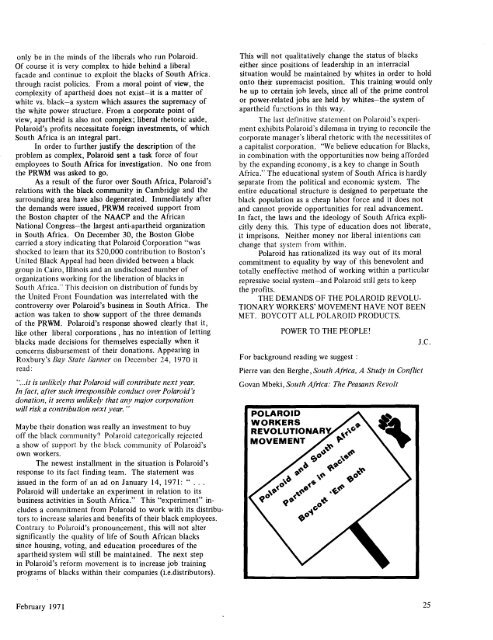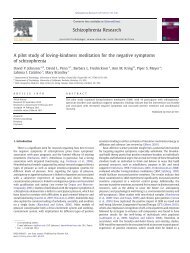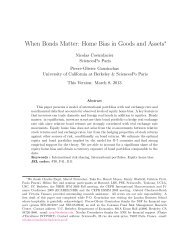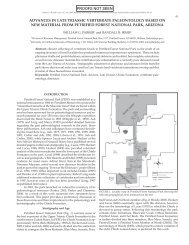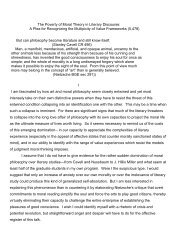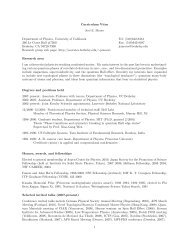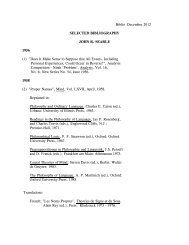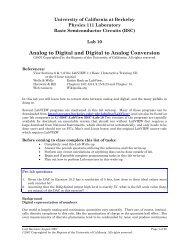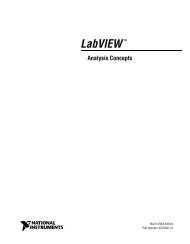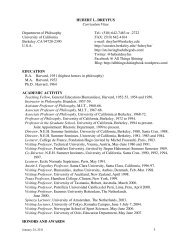Science for the People Magazine Vol. 3, No. 1 - Socrates
Science for the People Magazine Vol. 3, No. 1 - Socrates
Science for the People Magazine Vol. 3, No. 1 - Socrates
Create successful ePaper yourself
Turn your PDF publications into a flip-book with our unique Google optimized e-Paper software.
only be in <strong>the</strong> minds of <strong>the</strong> liberals who run Polaroid.<br />
Of course it is very complex to hide behind a liberal<br />
facade and continue to exploit <strong>the</strong> blacks of South Africa.<br />
through racist policies. From a moral point of view, <strong>the</strong><br />
complexity of apar<strong>the</strong>id does not exist-it is a matter of<br />
white vs. black-a system which assures <strong>the</strong> supremacy of<br />
<strong>the</strong> white power structure. From a corporate point of<br />
view, apar<strong>the</strong>id is also not complex; liberal rhetoric aside,<br />
Polaroid's profits necessitate <strong>for</strong>eign investments, of which<br />
South Africa is an integral part.<br />
In order to fur<strong>the</strong>r justify <strong>the</strong> description of <strong>the</strong><br />
problem as complex, Polaroid sent a task <strong>for</strong>ce of four<br />
employees to South Africa <strong>for</strong> investigation. <strong>No</strong> one from<br />
<strong>the</strong> PRWM was asked to go.<br />
As a result of <strong>the</strong> furor over South Africa, Polaroid's<br />
relations with <strong>the</strong> black community in Cambridge and <strong>the</strong><br />
surrounding area have also degenerated. Immediately after<br />
<strong>the</strong> demands were issued, PRWM received support from<br />
<strong>the</strong> Boston chapter of <strong>the</strong> NAACP and <strong>the</strong> African<br />
National Congress-<strong>the</strong> largest anti-apar<strong>the</strong>id organization<br />
in South Africa. On December 30, <strong>the</strong> Boston Globe<br />
carried a story indicating that Polaroid Corporation "was<br />
shocked to learn that its $20,000 contribution to Boston's<br />
United Black Appeal had been divided between a black<br />
group in Cairo, Illinois and an undisclosed number of<br />
organizations working <strong>for</strong> <strong>the</strong> liberation of blacks in<br />
South Africa.·· This decision on distribution of funds by<br />
<strong>the</strong> United Front Foundation was interrelated with <strong>the</strong><br />
controversy over Polaroid's business in South Africa. The<br />
action was taken to show support of <strong>the</strong> three demands<br />
of <strong>the</strong> PRWM. Polaroid's response showed clearly that it,<br />
like o<strong>the</strong>r liberal corporations , has no intention of letting<br />
blacks made decisions <strong>for</strong> <strong>the</strong>mselves especially when it<br />
concerns disbursement of <strong>the</strong>ir donations. Appearing in<br />
Roxbury's Bay State Banner on December 24, 1970 it<br />
read:<br />
" ... it is unlikely that Polaroid will contribute next year.<br />
In fact, after such irresponsible conduct over Polaroid's<br />
donation, it seems unlikely that any major corporation<br />
will risk a contribution next year. "<br />
Maybe <strong>the</strong>ir donation was really an investment to buy<br />
off <strong>the</strong> black community? Polaroid categorically rejected<br />
a show of support by <strong>the</strong> black community of Polaroid's<br />
own workers.<br />
The newest installment in <strong>the</strong> situation is Polaroid's<br />
response to its fact finding team. The statement was<br />
issued in <strong>the</strong> <strong>for</strong>m of an ad on January 14, 1971: " ...<br />
Polarqid will undertake an experiment in relation to its<br />
business activities in South Africa." This "experiment" includes<br />
a commitment from Polaroid to work with its distributors<br />
to increase salaries and benefits of <strong>the</strong>ir black employees.<br />
Contrary to Polaroid's pronouncement, this will not alter<br />
significantly <strong>the</strong> quality of life of South African blacks<br />
since housing, voting, and education procedures of <strong>the</strong><br />
apar<strong>the</strong>id system will still be maintained. The next step<br />
in Polaroid's re<strong>for</strong>m movement is to increase job training<br />
programs of blacks within <strong>the</strong>ir companies (i.e.distributors).<br />
This will not qualitatively change <strong>the</strong> status of blacks<br />
ei<strong>the</strong>r since positions of leadership in an interracial<br />
situation would be maintained by whites in order to hold<br />
onto <strong>the</strong>ir supremacist position. This training would only<br />
he up to certain joh levels, since all of <strong>the</strong> prime control<br />
or power-related jobs are held by whites-<strong>the</strong> system of<br />
apar<strong>the</strong>id ful!ctions in this way.<br />
The last definitive statement on Polaroid's experiment<br />
exhibits Polaroid's dilemma in trying to reconcile <strong>the</strong><br />
corporate manager's liberal rhetoric with <strong>the</strong> necessitites of<br />
a capitalist corporation. "We believe education <strong>for</strong> Blacks,<br />
in combination with <strong>the</strong> opportunities now being af<strong>for</strong>ded<br />
by <strong>the</strong> expanding economy, is a key to change in South<br />
Africa.'· The educational system of South Africa is hardly<br />
separate from <strong>the</strong> political and economic system. The<br />
entire educational structure is designed to perpetuate <strong>the</strong><br />
black population as a cheap labor <strong>for</strong>ce and it does not<br />
and cannot provide opportunities <strong>for</strong> real advancement.<br />
In fact, <strong>the</strong> laws and <strong>the</strong> ideology of South Africa explicitly<br />
deny this. This type of education does not liberate,<br />
it imprisons. Nei<strong>the</strong>r money nor liberal intentions can<br />
change that system from within.<br />
Polaroid has rationalized its way out of its moral<br />
commitment to equality by way of this benevolent and<br />
totally eneffective method of working within a particular<br />
repressive social system-and Polaroid still gets to keep<br />
<strong>the</strong> profits.<br />
THE DEMANDS OF THE POLAROID REVOLU<br />
TIONARY WORKERS' MOVEMENT HAVE NOT BEEN<br />
MET. BOYCOTT ALL POLAROID PRODUCTS.<br />
POWER TO THE PEOPLE!<br />
For background reading we suggest :<br />
Pierre van den Berghe, South Africa, A Study in Conflict<br />
Govan Mbeki, South Africa: The Peasants Revolt<br />
POLAROID<br />
WORKERS<br />
REVOLUTIONAR<br />
MOVEMENT<br />
J.C.<br />
February 1971<br />
25


